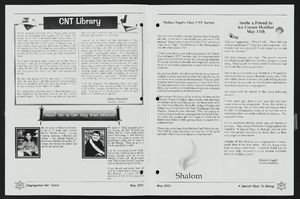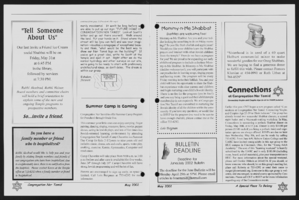Search the Special Collections and Archives Portal
Search Results

Gene Noboru Nakanishi oral history interview: transcript
Date
Archival Collection
Description
Oral history interview with Gene Noboru Nakanishi conducted by Ayrton Yamaguchi, Cecilia Winchell, and Stefani Evans on April 2, 2021 for Reflections: The Las Vegas Asian American and Pacific Islander Oral History Project. Gene Nakanishi shares his detailed family history from both his father's and his mother's families. He discusses his paternal grandfather's work on the Union Pacific Railroad, the family's internment in Wyoming during World War II, and his father's release from the camp by joining the United States Army Signal Corps. Nakanishi also talks of his maternal grandfather who was of the Bushido ("warrior") class in Osaka, Japan, and his grandfather's work with Christian missionaries. He shares details of his mother's restaurant employment in Los Angeles and her opening of Osaka Japanese Bistro in Las Vegas in 1969. Nakanishi also talks about being born and raised in Las Vegas, his musical schooling at Berklee College of Music in Boston, and his graduate education at Harvard University. He discusses his work as a band teacher for the Clark County School District, his involvement in the Idyllwild Arts Summer Program band camp, and his interests in jazz music.
Text

Transcript of interview with Danny Lee by Claytee White and Stefani Evans, May 23, 2016
Date
Archival Collection
Description
Folks who graduated Boulder City High School in 1953 and who began kindergarten there might remember being in kindergarten class with Clark D. "Danny" Lee. They would be excused for not remembering the towheaded Lee; after all, he was in Boulder City only for the first half of the year. They also would be excused for not remembering Lee because he never stayed in school once he arrived. Danny was the child whose mother faithfully brought him to class every day. And every day, as soon as his mother dropped him off, he took off and beat his mother home. Danny Lee was born in his grandparents’ house in North Las Vegas, grew up on 10 Bonneville Street, and (except for his first semester of kindergarten in Boulder City) attended Fifth Street Elementary School and Las Vegas High School, where he graduated in 1953 with Rex Bell. In 1960 he married fellow Las Vegas High grad and former Rhythmette, Dorothy Damron; they have raised four children. Here, Lee talks about the difficulties his father had finding work and supporting a family during the Great Depression-of living with relatives and moving from place to place in the small travel trailer as his father found work. He describes a hardscrabble Las Vegas, where he and other kids in in multiethnic groups found temporary work helping drovers in the stockyards or filling blocks of ice in the icehouse. He recalls working for Superior Tire during high school and for the Union Pacific Railroad in a variety of jobs after graduation and the U.S. Army-including a stint as a Union Pacific tour director. v Lee’s early kindergarten career seems an unlikely academic indicator for a man who would spend most of his adult life volunteering for and lobbying on behalf of Clark County public libraries and who the American Library Association would select as the 1990 Library Trustee of the Year. Ironically, Lee was asked to serve on the Clark County Library District board of directors to get rid of a troublesome library director. Instead, he became one of the director’s staunchest advocates. It is appropriate that Danny and his wife, Dorothy, are pictured here surrounded by library books. The native Las Vegan built a lifetime career as a State Farm Insurance salesman, but in this interview he focuses on his public library advocacy, his time as trustee for the Clark County Library District; the formation of the Las Vegas-Clark County Library District; the ambitious building program funded by $80 million in voter-approved statewide bonds; and the political wrangling in Carson City necessary to achieve these ends. Lee’s oral history complements that of his wife, Dorothy Lee, and of Charles Hunsberger, who was the “troublesome” library director at the time Lee was trustee. Lee made his living as an insurance salesman. Lee’s ability to sell a product-whether it be insurance or an $80 million bond issue-is the attribute that made Danny Lee so valuable as a trustee to the Las Vegas-Clark County Library District and consequently, to all Clark County residents who value public library services. However, his passion, and dedication, and unbowed determination earned him the Library Trustee of the Year award. As Lee closes the interview, he locks eyes with Dorothy and muses, "Let me tell you what I'm most proud of in all . . . I've been married to this lady for fifty six years now. . . . I've lived a very blessed life. Being born in my grandmother's house and having lived in little travel trailers, it's just good. It's worked. We're living like we've always wanted to live right now."
Text

Transcript of interview with Michael J. Montandon by Stefani Evans and Claytee D. White, September 22 & October 4, 2016
Date
Archival Collection
Description
Mike Montandon, former Arizonan and former three-term mayor of the City of North Las Vegas (1997-2009), is a natural storyteller. As he recalls municipal governance during a period of record-breaking growth, he talks of forming relationships with developers, legislators, and other municipalities; he speaks to land use, open space, parks, trails, conservation and the Bureau of Land Management (BLM) and Southern Nevada Public Lands Management Act (SNPLMA). He shares histories and stories of the Becker family's role in developing Clark County, of the Combs family's North Las Vegas pig farm; of the drama that routinely characterized BLM land auctions, and of why North Las Vegas spent millions of dollars to build its own sewage treatment plant. The guy who never ran for office in high school or college moved to North Las Vegas in 1992 and four years later was elected as mayor of one of the nation's fastest-growing cities. He ran because he realized the City was populated with people just l
Text

Transcript of interview with F. Andrew Taylor by Claytee White, September 30, 2013
Date
Archival Collection
Description
F. Andrew Taylor has been a Las Vegas resident for over 20 years, moving to the city by way of New England and Georgia at the age of 28. Armed with a degree in painting from the Swain School of Design, got a job at a Laughlin casino as a caricature artist. After a brief stay in Laughlin and Bullhead City, Andrew moved to Ward I, where his girlfriend, now wife, lived. They soon moved to the Spring Valley area, where Andrew later learned through conversations with neighbors and his own research that the home sat on what was the old Stardust Racetrack. With Andrew’s move to the city came new professional opportunities. He got a job at CityLife as the in-house artist and graphic designer, what was then apart of Wick Communications. After a year, Andrew began reporting, initially working for the Sunrise/Whitney paper, and eventually working the downtown beat. Always feeling the pulse of the local arts and culture scene, he has attended First Fridays since it started, continues his own art,
Text

Lee Tilman interview, 1996: transcript
Date
Archival Collection
Description
In the interviews, Tilman discusses his birth in Gooding, Idaho in 1913, his early life, and his arrival to Las Vegas, Nevada in 1931. Tilman then talks about his experiences mining, milling, and ranching before moving to Las Vegas. While in Las Vegas, Tilman was involved with construction of Hoover Dam (Boulder Dam) and labor issues. Later, Tilman describes fishing and boating in the Colorado River, working at a duplex mine in Searchlight, Nevada, and working at the Las Vegas Ice House. Lastly, Tilman talks about influential Boulder City residents he knew, his children, and the Stratosphere Hotel and Casino.
Text

Transcript of interview with Tom Wright by Claytee White, February 14, 2005
Date
Archival Collection
Description
Dr. Tom Wright was born and grew up in Illinois. His father finished his PhD in Chicago and then taught at Illinois College in Jacksonville. His mother suffered from arthritis and was told to seek a warmer climate, so John Wright packed up his family and moved to Las Vegas. Tom was 14, ready for high school, and his two brothers were elementary school age. Tom attended Las Vegas High School, which was close to the Crestwood community where the family had purchased their first home. He remembers that UNLV had no buildings when his dad first started teaching there. Instead, he conducted class in high school classrooms and church Sunday school rooms. Dr. Wright started off at a community college as a Geology Major, but a class with Bud Poland convinced him that history was his passion. He transferred to Pomona to continue his bachelor's degree. He spent his junior year in Peru on a study-abroad program, and that experience made him a Latin Americanist. The information he gath
Text

John Robinson Pacheco interview, June 24, 2019: transcript
Date
Archival Collection
Description
Interviewed by Laurents Bañuelos-Benitez. John Pacheco's father, Francisco, arrived in Las Vegas in 1942. John was born in 1947 and raised mostly on 27th Street. He is a graduate of Rancho High School and UNLV. He is a retired artist known for hand-painting signage for many local businesses. As a very civic minded person, John has received many local awards and served on committees for the Las Vegas Chamber of Commerce, East Las Vegas community, and much more.
Text

Transcript of interview with Carl F. Kelley by James M. Greene, May 2, 1972
Date
Archival Collection
Description
On May 2, 1972, James M. Greene interviewed Carl F. Kelley (born May 19th, 1922 in Ohio) about his life in Southern Nevada. The two talk about how Kelley first moved to Nevada and his original addresses. Kelley describes living in Boulder City, Las Vegas, and Henderson. The interview concludes with an in-depth discussion of the Civilian Conservation Corps activities in Boulder City, Nevada.
Text


